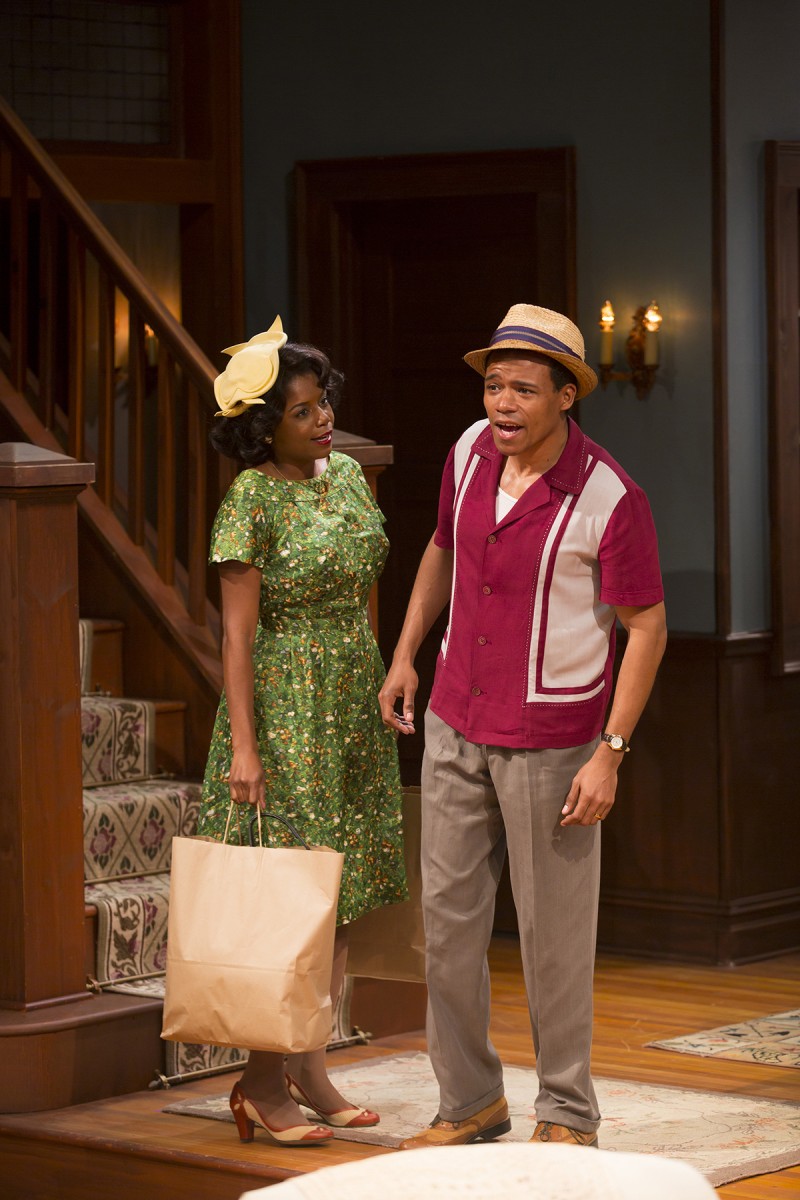Review of Lewiston at Long Wharf Theatre
Family legacy meets national legacy in Samuel D. Hunter’s low-key play Lewiston, now at the Long Wharf Theatre in its world premiere, directed by Eric Ting. Alice (Randy Danson) and Connor (Martin Moran) are old friends, now roommates, who tend a fireworks stand on a stretch of interstate outside the play’s titular town in rural Idaho. The big issue in their world is when to sell Alice’s last remaining plot of land to the developers who are building condos, and for how much—the duo are hoping for a unit by the pool. Into their humdrum lives arrives Marnie (Arielle Goldman), a backpacking traveler who, it turns out, is Alice’s long-lost granddaughter. And she’s here to stay, tent and all.
Alice (Randy Danson) and Connor (Martin Moran)
The best thing about Lewiston is that Hunter’s dialogue plays things close to the everyday, and there are some unique aspects to the relationships revealed as the play goes along. His characters speak with a believable sense of entire lives already lived, so that when exposition is necessary it comes as one character filling another in. For Alice and Marnie, there’s much that has gone missing—the last time Alice saw Marnie was when the girl, now in her mid-twenties, was 8 or so. There’s a lot of water under the bridge, and there’s a lot of land missing from what Marnie remembers as the family spread, including her childhood home. The land has been in the family since Meriwether Lewis, of the famed Lewis and Clark expedition, settled it.
Marnie (Arielle Goldman)
Director Eric Ting’s clear grasp of how these characters should interact means developments take their time: the coolness between Alice and Marnie keeps finding new reasons for sustaining itself. It’s not a question of grudges so much as a question of expectations. We learn piecemeal the story of Alice’s daughter, Marnie’s mother—whose young voice (played by Lucy Owen) we hear on tapes Marnie plays from time to time, recorded when her mother walked the Expedition trail to the Pacific Ocean—and we see why the two women aren’t quite sure what tone to strike with each other. Marnie isn’t so much settling old scores as trying to find a place to start again, arriving at the very moment when Alice is ready to let it all go.
Connor (Martin Moran) and Marnie (Arielle Goldman)
As Connor, Moran’s role is important as an interested witness and sympathetic helper and a surprised host who extends the more effusive welcome to Marnie. The drama of the play is largely about how people can either shut others out or let them in, so that much of the talk isn’t simply about what happened or what will happen, it’s about whether or not characters will confide or find a shared relation. Marnie, played well with understated intensity by Arielle Goldman, had been in Seattle where she devised and sold an urban farm and seems to have been self-sufficient until now. Randy Danson’s Alice is, as Connor says “a bit prickly,” not willing to be knocked off course by a young person’s sudden need for roots. Though for obvious reasons generational differences can be expected to intrude, they do so as contextual details and not simply for cheap laughs.
Then there’s “Mom,” on the tapes. Voiced with an incredible sense of off-the-cuff authenticity by Lucy Owen, the tapes are mostly played in darkness, making their staging a bit disruptive and their desultory commentary more ambient than dramatic. In the end, an experience told on the tape dovetails rather too neatly with the need for some kind of statement to emerge in what seems ready to be a stalemate, though some life-changing decisions are overtaking everyone by the play’s end.
Alice (Randy Danson)
For visual interest, check out the detailed set by Wilson Chin, complemented by Matthew Richards’ lighting and Brandon Walcott’s sound design, while for figural interest there are the fireworks that tend to act as ironic commentary on the lack of excitement and the limited prospects for amusement in this stretch of the interstate. Lewiston is a thoughtful slice-of-life drama that manages to suggest a Chekhovian sense of how time and change leech from us the things we value, unless we do something about it now.
Lewiston
By Samuel D. Hunter
Directed by Eric Ting
Set Design: Wilson Chin; Costume Design: Paloma Young; Lighting Design: Matthew Richards; Sound Design: Brandon Wolcott; Production Stage Manager: Charles M. Turner III; Casting: Calleri Casting
Cast: Randy Danson; Arielle Goldman; Martin Moran; Lucy Owen
Long Wharf Theatre
April 6-May 1, 2016









